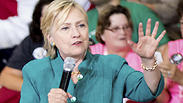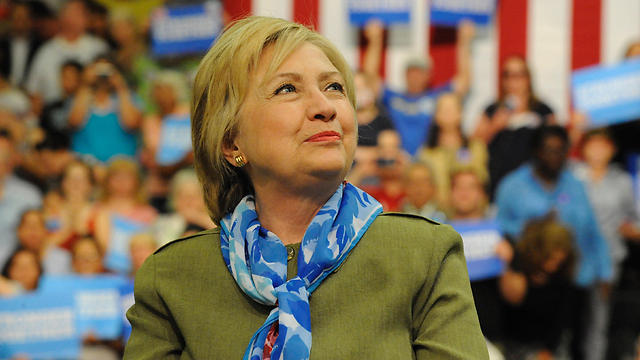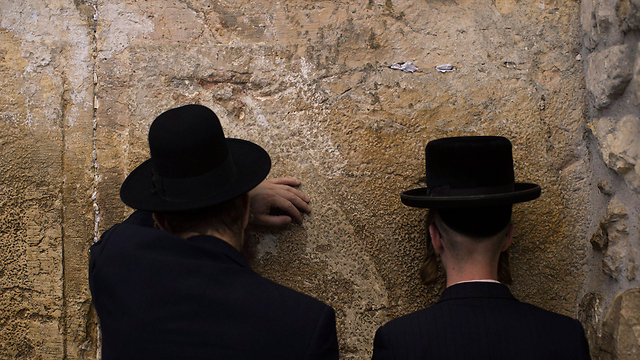
Hillary Clinton
צילום: AP
In Israel's religious press, Hillary Clinton is invisible
The Democratic presidential nominee seldom appears in Israel's ultra-Orthodox press as editors cater to the readership's religious traditions of strict gender separation; Bill Clinton or Tim Kaine the preferred photo of choice; 'Our readers don't want to be exposed to that,' says editor of Haredi newspaper.
Hillary Clinton may become the president of Israel's most important ally, but her image is banished from a significant swath of the country's media: the ultra-Orthodox press whose deeply conservative readership chafes at images of women.
Clinton's nomination as Democratic candidate for the US presidency is casting light on a longstanding policy that has already applied to other female figures from Germany's Angela Merkel to Israel's own prime minister Golda Meir. But whereas the election is causing some discussion among US ultra-Orthodox media, their Israeli equivalents are digging in their heels.
"For us there is no question. We will not publish pictures of women, period," said Meni Shwartz, editor of the ultra-Orthodox news site Behadrei Haredim.
About 11 percent of Israel's 8.5 million citizens are Haredi, or ultra-Orthodox. Recognizable by their black hats and long black clothes, they often lead insular lives, separated from the more secular Jewish majority and closely adhering to Jewish laws.
The emphasis placed on gender-determined values or traditions remains a conspicuous feature of the Haredi community’s lifestyle.
Ultra-Orthodox women traditionally dress in long skirts and long-sleeved shirts, covering their hair if they are married. Men and women sit separately at synagogues and weddings and unrelated women and men refrain from physical contact.
Ultra-Orthodox media, which include four daily newspapers, two main weeklies and two main web sites, cater to conservative ideals that include preserving women's modesty and skipping topics involving drugs, murder and sex. Many consider showing pictures of women a violation of those values, however newsworthy the figure.
When covering stories relating to Hillary Clinton, Haredi media prefer to use pictures of the White House, Democratic running mate Tim Kaine or even Bill Clinton.
The issue sparked discussion in Israel this year when Yated Neeman, the largest ultra-Orthodox daily, published a story about Clinton's choice of Kaine as her running mate, accompanied by a photograph of Clinton's husband.
The pictures led Yair Ettinger, a journalist who covers religion for the leftist, secular daily Haaretz, to Tweet; "Hey, Yated Neeman, what will happen if Hillary really wins? Four years of photos of Bill?"
Beni Rabinovich, a journalist at Yated Neeman, tweeted back that the Haredi press has "a clear and rigid line on this issue. Without Bill or with Bill, we'll manage."
Yaakov Lustigman, foreign affairs reporter for the popular Haredi newspaper Hamevaser, said his readers are fascinated by the US elections and "we have no problem with there being a female president"—but they don't want to see Clinton's picture or even read her first name.
Hamevaser caused controversy when it edited German Chancellor Angela Merkel out of a picture of world leaders marching through Paris after extremists attacked the offices of the satirical Charlie Hebdo magazine in 2015.
Homodia, a veteran ultra-Orthodox paper, is the only current Haredi daily that existed during the administration of Meir, Israel's only female prime minister. A reporter there said that at the time, in the early 1970s, the newspaper did not publish her picture.
News site Kikar Hashabbat publishes demure photographs of Clinton and other female leaders, according to foreign affairs reporter Israel Cohen.
"Hillary Clinton is in her 60s. She's solid, she dresses modestly and she's likely to be the next president," Cohen said. "You cannot ignore it."
But it is the lone exception, and journalists at rival publications said they don't consider the site to be truly Haredi because of its policy.
Rivka Neria-Ben Shahar, an expert on Haredi media at Sapir College in Sderot, said ultra-Orthodox newspapers have become more conservative in the past decades—but her studies show Haredi women today overwhelmingly support the policy.
Ultra-Orthodox rabbis, some with tens of thousands of followers, set the guidelines for what is acceptable in their communities. Several ultra-Orthodox papers have rabbinical committees overseeing their content, and journalists say the issue of whether to publish Hillary Clinton's picture hasn't been discussed.
Behadrei Haredim, headquartered in the ultra-Orthodox enclave of Bnei Brak near Tel Aviv, walks a tight line between conservative ideals and the modern essence of being online.
Shwartz, the editor, said he gets about 1 million unique visits to the site a month, with users coming from Israel and around the world. The only photographs of women are in a section called "women's lobby," which focuses on cooking, motherhood and lifestyle. Users entering this area are warned that only women should proceed.
Atara Sternbuch, an observant woman who runs the site's English section, said the lack of women's pictures on the main site is "just not an issue." She said people who want to see pictures of Hillary Clinton can search elsewhere. "We want to make it comfortable to our readers who don't want to be exposed to that," she said.
American ultra-Orthodox media have traditionally shied away from publishing women's pictures as well. But the prospect of a Clinton presidency is stirring some debate. One newspaper recently broke a taboo by publishing a picture of Hillary Clinton's hand.
Rabbi Yitzchok Frankfurter, editor of the weekly Ami Magazine in New York, said he would consider printing Clinton's photograph if rabbinical authorities allow it.
"We don't want to isolate the executive branch of the US government," Frankfurter said. "It's too important for us as Jews who are citizens of the US and as Jews who are friends of Israel."
Sheldon Schorer, former chairman of Democrats Abroad Israel, derided the policy of excluding women's pictures and said it put Clinton at a disadvantage. "I don't think the Jewish religion really requires that."













